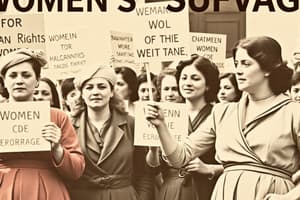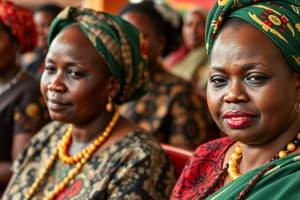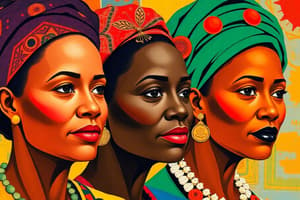Podcast
Questions and Answers
How does violence against women impact their participation in public and political life?
How does violence against women impact their participation in public and political life?
Violence against women hinders their ability to participate in public and political life by reinforcing their marginalization and limiting their access to such spaces.
What is intersectionality, and why is it important in understanding discrimination against women?
What is intersectionality, and why is it important in understanding discrimination against women?
Intersectionality refers to the overlapping forms of discrimination that women face, which are crucial for understanding their unique challenges and unequal access to public and political life.
What obligations do democratic regimes have in terms of women's equality in political life?
What obligations do democratic regimes have in terms of women's equality in political life?
Democratic regimes are obligated to ensure equality for women in public and political life, as it is a prerequisite for their legitimacy and responsibility.
What does Article 1 of CEDAW define as discrimination?
What does Article 1 of CEDAW define as discrimination?
Signup and view all the answers
How does CEDAW contribute to women's rights globally?
How does CEDAW contribute to women's rights globally?
Signup and view all the answers
In what ways can discrimination limit women's participation in public life?
In what ways can discrimination limit women's participation in public life?
Signup and view all the answers
Why is the prohibition of discrimination essential for women's political engagement?
Why is the prohibition of discrimination essential for women's political engagement?
Signup and view all the answers
What role does the UN Charter play in promoting women's equality?
What role does the UN Charter play in promoting women's equality?
Signup and view all the answers
What is the phenomenon of 'family voting' observed in some Eastern European countries?
What is the phenomenon of 'family voting' observed in some Eastern European countries?
Signup and view all the answers
Why is women's participation in political life often resisted by states?
Why is women's participation in political life often resisted by states?
Signup and view all the answers
How do socio-economic resources like education impact informal political participation?
How do socio-economic resources like education impact informal political participation?
Signup and view all the answers
What role does anonymity play in the political mobilization of women online?
What role does anonymity play in the political mobilization of women online?
Signup and view all the answers
List some forms of gender-specific violence faced by women defenders in political contexts.
List some forms of gender-specific violence faced by women defenders in political contexts.
Signup and view all the answers
In which political positions does the right to participate in political life apply?
In which political positions does the right to participate in political life apply?
Signup and view all the answers
Identify some barriers women face in accessing trade union membership.
Identify some barriers women face in accessing trade union membership.
Signup and view all the answers
What are 'women structures' in trade unions, and how do they contribute to gender equality?
What are 'women structures' in trade unions, and how do they contribute to gender equality?
Signup and view all the answers
What factors contribute to the underrepresentation of women in political roles?
What factors contribute to the underrepresentation of women in political roles?
Signup and view all the answers
What rights related to political participation are emphasized under Article 7 of CEDAW for women?
What rights related to political participation are emphasized under Article 7 of CEDAW for women?
Signup and view all the answers
What factors are traditionally considered in understanding political participation?
What factors are traditionally considered in understanding political participation?
Signup and view all the answers
Discuss one major trend in international politics regarding women's political representation over the last century.
Discuss one major trend in international politics regarding women's political representation over the last century.
Signup and view all the answers
How might traditional gender roles impact women's access to public debate?
How might traditional gender roles impact women's access to public debate?
Signup and view all the answers
How has the voter turnout among women changed in recent Indian elections?
How has the voter turnout among women changed in recent Indian elections?
Signup and view all the answers
How does Article 8 of CEDAW complement the rights established in Article 7?
How does Article 8 of CEDAW complement the rights established in Article 7?
Signup and view all the answers
What obligations do States have according to the CEDAW Committee regarding women's political participation?
What obligations do States have according to the CEDAW Committee regarding women's political participation?
Signup and view all the answers
What are some cultural barriers that impact women's voting and public debate participation?
What are some cultural barriers that impact women's voting and public debate participation?
Signup and view all the answers
What is one challenge women face when balancing family and public life in political participation?
What is one challenge women face when balancing family and public life in political participation?
Signup and view all the answers
Why are constitutional rights alone inadequate for ensuring women's political involvement?
Why are constitutional rights alone inadequate for ensuring women's political involvement?
Signup and view all the answers
In what ways must States address discrimination to support women's political involvement?
In what ways must States address discrimination to support women's political involvement?
Signup and view all the answers
What does the CEDAW Committee recommend regarding women’s representation at the international level?
What does the CEDAW Committee recommend regarding women’s representation at the international level?
Signup and view all the answers
How is gender equality defined by the CEDAW Committee?
How is gender equality defined by the CEDAW Committee?
Signup and view all the answers
What derived right allows women equal access to public spaces?
What derived right allows women equal access to public spaces?
Signup and view all the answers
What challenges remain in implementing women’s rights to public space according to CEDAW?
What challenges remain in implementing women’s rights to public space according to CEDAW?
Signup and view all the answers
What is the main purpose of ensuring adequate legal remedies for women in public and political life?
What is the main purpose of ensuring adequate legal remedies for women in public and political life?
Signup and view all the answers
Why is it important to withdraw reservations to CEDAW?
Why is it important to withdraw reservations to CEDAW?
Signup and view all the answers
What role do legislated quotas play in promoting women's access to decision-making positions?
What role do legislated quotas play in promoting women's access to decision-making positions?
Signup and view all the answers
How can accessible childcare contribute to women's participation in political life?
How can accessible childcare contribute to women's participation in political life?
Signup and view all the answers
What is the significance of monitoring political parties' gender policies?
What is the significance of monitoring political parties' gender policies?
Signup and view all the answers
What is one key recommendation for governments to promote gender equality?
What is one key recommendation for governments to promote gender equality?
Signup and view all the answers
How should international obligations be incorporated into national law according to the recommendations?
How should international obligations be incorporated into national law according to the recommendations?
Signup and view all the answers
What should be included in constitutional reforms to enhance gender equality?
What should be included in constitutional reforms to enhance gender equality?
Signup and view all the answers
Why is it important to involve civil society and women's organizations in gender equality reforms?
Why is it important to involve civil society and women's organizations in gender equality reforms?
Signup and view all the answers
What role does media play in promoting gender equality according to the recommendations?
What role does media play in promoting gender equality according to the recommendations?
Signup and view all the answers
What is a critical aspect of policies designed to improve women's participation in society?
What is a critical aspect of policies designed to improve women's participation in society?
Signup and view all the answers
What type of training is recommended for practitioners in various fields regarding gender equality?
What type of training is recommended for practitioners in various fields regarding gender equality?
Signup and view all the answers
What is the purpose of establishing a comprehensive data compilation methodology as per the recommendations?
What is the purpose of establishing a comprehensive data compilation methodology as per the recommendations?
Signup and view all the answers
Study Notes
Current Situation
- Social, cultural, and political practices are the focus of the current situation.
Objective
- The presentation intends to analyze the impact of social, cultural, and political practices on female political candidates.
- Historical voting trends, electioneering, political party and community support, and networking will be examined.
The Personal is Political
- The 'personal is political' is a feminist slogan, emphasizing that personal experiences of women are rooted in political situations and gender inequality.
- Carol Hanisch (1970) was a key figure in this concept.
- Hanisch's essay highlighted men's power and women's oppression, exemplified by domestic abuse where societal oppression is a contributing factor.
- The statement can be misinterpreted as suggesting women's personal behavior is politically significant, rather than focusing on societal factors.
- Consciousness-raising groups were a form of political action, highlighting political relationships within domestic contexts.
- Women realized that their personal problems had a broader political dimension, responding to accusations that women were responsible for their own situations.
- The presentation questions whether all personal actions of women are part of a wider political movement, and where to draw the line in this context.
- Second-wave feminists faced criticism for seemingly submitting to patriarchal oppression through choices like makeup and body hair.
Public and Political Life: Themes and the International Legal Framework
- Women continue to face significant discrimination in public and political life, across all geographical regions and domains of the public sphere.
- Barriers include economic, social, cultural issues, and entrenched gender roles and negative stereotypes.
- Gendered public and private spaces have been a critical focus of feminist scholarship for over two decades.
- The international community recognizes obligations to address barriers to women's political participation, but significant progress is still necessary at the domestic level.
- National laws and constitutions can negatively impact women's participation, limiting their roles.
- Entrenched gender roles and negative stereotypes persist as practical hurdles to participation.
- This is sometimes described as a "sexual division of labor" in family settings.
- Caregiver responsibilities and political violence/harassment against women limit their participation.
- Intersectionality, a key concept, emphasizes how various forms of discrimination against women reinforce their marginalization and lack of equal access to public and political spaces (e.g., indigenous/minority women, migrant women, those with precarious citizenship, women from the lesbian, bisexual, trans, and queer communities, rural women).
- Increased violence against women and its consequences contribute to exacerbating their status.
The International Human Rights Legal Regime
- Equality for women in public and political life is an obligation, a pre-requisite for legitimate democratic regimes.
- The UN Charter enshrines principles of equality and prohibits discrimination, fundamental to women's access to public and political life.
Convention on the Elimination of Discrimination Against Women (CEDAW)
- CEDAW's provisions encompass any difference in treatment based on sex which intentionally or in practice, places women in a disadvantaged position, preventing full recognition of their rights.
- CEDAW aims to eliminate discrimination within public and political life.
- Article 7 emphasizes the rights of women in political participation, including elections, and public office.
- Article 8 supports women representing their governments and participating internationally.
CEDAW Committee
- They outline obligations for states to guarantee women's rights to political participation.
- These obligations include incorporating voting rights, creating adequate spaces for women's groups, and addressing discriminatory attitudes toward women.
New Political Spaces: Cyberspace, ICTs and Social Media
- Women's participation in formal public and political life is important, but political decision-making occurs within formal and informal spaces.
- The internet offers new spaces for political discourse and participation, empowering previously marginalized communities.
- The significance of socio-economic resources such as education might lessen when considering informal participation, due to lower entry costs.
- The gender equality gap is diminishing through new avenues of political participation.
- Internet use and online anonymity helped Lebanese lesbian feminist groups mobilize, which became defining aspects of their movement.
- Barriers to women in trade unions include lack of knowledge about benefits, fear of reprisal, and time constraints.
- Progress in gender equality in trade unions is often linked to strong internal women's structures, and representation through collectives, committees, networks and meetings.
Political Participation
- Political participation is often understood as the right to choose political leadership, and the ability to participate in political leadership and mechanisms.
- Women's vote turnout is increasing in various countries, such as India (e.g., Punjab, Uttar Pradesh, Manipur, Uttarakhand, and Goa).
The Right to Take Part in Public Debate
- Women's Participation in public debate is fundamental to political life.
- Often, states resist change from women's activists, especially when it clashes with existing authoritative regimes or traditional family structures.
- Women defenders face gender-specific challenges like verbal abuse, sexual assault, intimidation, and judicial consequences.
The Right to Participate in Political Life
- The right to participate in political life includes leading positions in government, local politics, and the judiciary.
- Women's formal political representation increased significantly internationally over a century.
Barriers to Women's Participation in Political Life
- Resistance to women's political participation frequently stems from prevailing gender norms about women's abilities to lead.
- Stereotypes suggest women are less qualified and may not possess necessary leadership skills and abilities due to their roles as caregivers.
- Difficulty balancing family and political life, as many women are primarily responsible for household tasks and childcare.
- Limited financial resources, which hinder women's ability to support their political campaigns.
- Violence and sexual harassment also create a hostile environment that compromises their participation.
- Lack of experience and knowledge among women candidates may be overlooked by political parties.
Recommendations
- Recommendations for governments, parliaments, political parties, and civil society organizations offer strategies to promote women's political participation.
- These involve removing discriminatory legislation, providing policies toward gender equality, promoting training and education, addressing violent crime against women, addressing systemic discrimination, and ensuring financial support and equality.
Studying That Suits You
Use AI to generate personalized quizzes and flashcards to suit your learning preferences.
Related Documents
Description
This quiz explores the complex barriers women face in participating in public and political life. It examines concepts such as intersectionality, discrimination as defined by CEDAW, and the impact of socio-economic factors. Dive into the essential role of democratic regimes and international laws in promoting women's equality.





